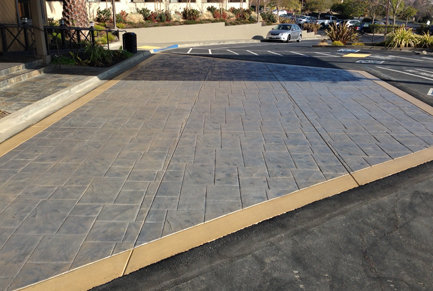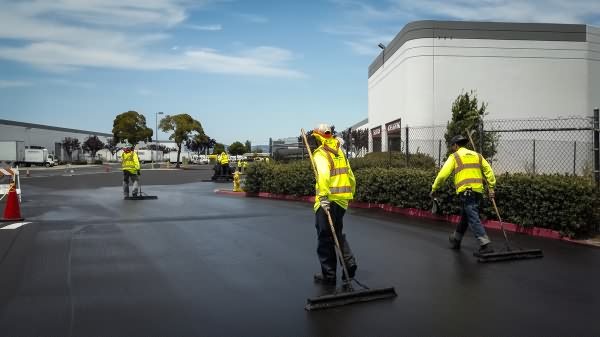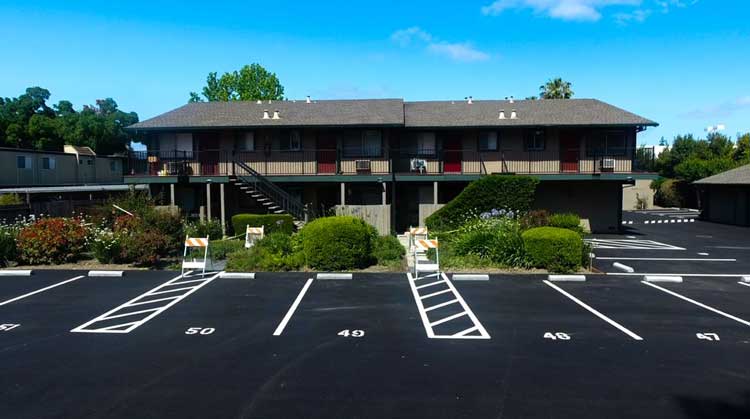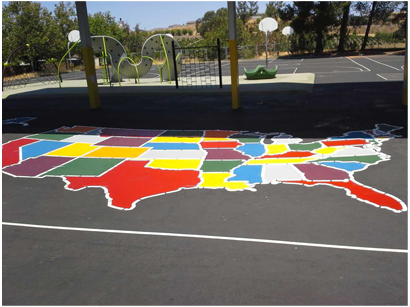Are concrete roads better than asphalt? The debate over concrete versus asphalt roadways has been long and fraught, as each paving method has its own benefits and drawbacks. Which option is best for your application will depend on many factors. Find out why you might choose to use concrete for roads instead of asphalt with this insider info from our Bay Area paving pros. With our expert help, you can choose the right road and parking lot paving solution for your business.

Concrete Vs. Asphalt – Pros and Cons
Concrete roads
Concrete roads, made of aggregates including crushed rock and sand, cement, and water, are more eco-friendly than asphalt roads. The smoother surface texture of concrete paving reduces rolling resistance compared to rougher asphalt, improving fuel economy by 2-5% for each vehicle, but this greener paving solution comes at a price. The smooth, uniform, highly durable surface of concrete costs more than asphalt. Its hard, unyielding surface also lasts longer – 25 years or more – requiring less frequent maintenance and replacement, which reduces environmental impact. However, concrete is more prone to cracking and breaking with time, especially without perfectly uniform sublayers.
Asphalt roads
Asphalt roads, made of aggregates bound by bitumen (derived from crude oil), aren’t as environmentally friendly and durable as concrete. They last about 15 years on average, requiring more frequent maintenance and replacement. New asphalt installation costs less, however, making them a popular choice. Bitumen makes asphalt more flexible than concrete, allowing it to accommodate sublayer imperfections more easily. Asphalt offers a less uniform surface than concrete. This helps prevent skidding and improve traction in California’s snowy foothill and mountain regions but increases rolling resistance, impacting gas mileage for traveling vehicles.
New Concrete Additives Reduce Cracking, Facilitating Lasting, Greener Paving Solutions
Concrete additives exist that reduce concrete cracking by 90%, minimizing maintenance and replacement frequency. American Asphalt’s paving team has the knowledge and experience to put the latest additive technology to work for your business, creating more durable concrete so that you can choose more environmentally friendly paving solutions without worrying about cracking and breakage. We can make the ideal blend for your setup, offering options that improve flexibility, reduce weight, stand up to traffic from heavy commercial vehicles, impart earthquake resistance, and more.
Ensure a Brighter Future with Sustainable Paving
Creating roadways that reduce carbon emissions and lessen environmental impact is essential to paving the way to a safer climate future. American Asphalt is here to help Bay Area businesses, providing greener paving solutions by:
- Recycling used paving materials to keep them out of area landfills
- Sourcing local ingredients and supplies whenever possible
- Creating durable, structurally sound roadways with quality materials that require less maintenance and last longer
- Providing affordable asphalt repair and sealcoating solutions so businesses in all economic situations can reduce the frequency of pavement replacement
- Investigating and implementing the latest tools and asphalt technology to reduce rolling resistance and fuel consumption by every vehicle using our roadways
Are you interested in using concrete for roads instead of asphalt? Contact American Asphalt at 510-723-0280 to learn more about our greener paving solutions today.
Related Blog Posts


